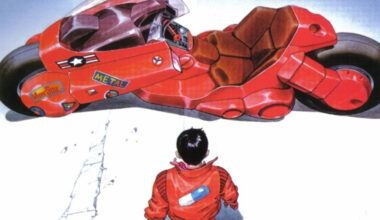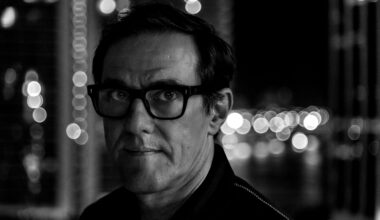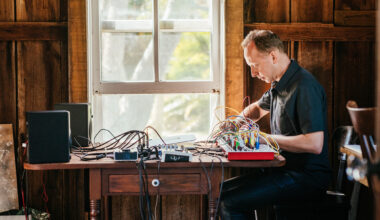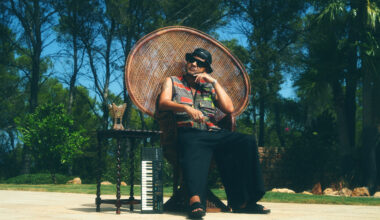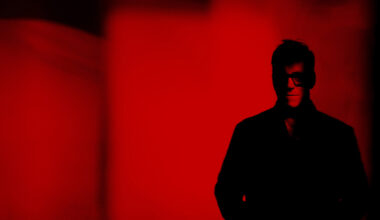Not content with delivering a thumpingly good new album, Asian Dub Foundation have also penned a superb live score for George Lucas’ dystopian sci-fi classic ‘THX 1138’. “Our default position is to do the opposite of what most bands do,” says ADF main man Steve “Chandrasonic” Savale. And then some
It can hardly have escaped your notice that this summer marks the 20th anniversary of the Battle of Britpop, when Blur and Oasis raced each other to the top of the singles charts. It was a deeply conservative time for indie rock, when white guitar bands draped themselves in the Union Flag and recreated a karaoke theme park version of the swinging 60s.
But of course, the real story of British pop in the mid-90s was much more rich and complex than all the nostalgic broadsheet pieces and rose-tinted reunion shows suggest. The most exciting artists of the era were multicultural, forward-thinking, sonically challenging and heavily electronic. They were more interested in forging the future than wallowing in the past. And leading the vanguard, all guns blazing, were Asian Dub Foundation.
It was 20 years ago that ADF released their debut album, ‘Facts And Fictions’, exploding out of east London with a fissile fusion of punky electronica, reggae, hip hop, bhangra and drum ’n’ bass. They attracted some famous fans, from Primal Scream to Radiohead, the Beastie Boys to David Bowie. And they have continued to move forward ever since, expanding their multicultural mash-up sound. Innovators, not imitators.
“I think you’d be hard pushed to find an album before 1995 which is live bass, post-punk guitar, jungle beats and a jungle MC,” says the band’s musical driving force, Steve “Chandrasonic” Savale. “The drum ’n’ bass scene at the time was very different to what we were doing. Roni Size was excellent stuff, but more that sophisticated jazz thing. ADF was definitely more of a link between the jump-up jungle and the punk tempo. Public Image were a huge influence on us. We had that whole post-punk thing, but we also had the dub and jungle and electronic thing as well.”
Steve Savale has found time to talk in the middle of a frenetic summer schedule for Asian Dub Foundation. The band are fresh from premiering their latest live film score, for the cult sci-fi thriller ‘THX 1138’, and are currently hopping around European festivals promoting their new album, ‘More Signal More Noise’. Co-produced by On-U Sound legend Adrian Sherwood, the album was first released in embryonic form in 2013 as ‘The Signal And The Noise’. Re-recorded as a more muscular version following a long tour, the reboot is a kaleidoscopic, dynamic, euphoric affair.
“Personally, it’s where I’ve always wanted to be with the band,” Savale declares. “I really think we’ve got there this time with that kind of left-field rock ’n’ roll dub-dance hybrid. Something clicked with ‘More Signal More Noise’ and it is absolutely the closest we’ve got to the live vibe, because in a way it was done live. We had started gigging these tracks, and of course they changed and developed. They became wilder, more joyous, with elements of delirium. You can’t get that in the studio, but it’s such an important part of what we do.”
Social and political themes are a key part of ADF’s creative DNA. The collective grew out of Community Music, a series of workshops on electronic music held in deprived areas of east London by band co-founders Aniruddha Das (aka Doctor Das) and John Pandit (Pandit G). One track on the new album, ‘Radio Bubblegum’, is a dub-driven attack on the content-free hollowness, ageism and racism of contemporary pop playlists. Another, ‘Get Lost Bashar’, mixes fierce glitchy electronics with rousing chants from Syrian poet Ibrahim Qashoush, who was murdered in 2011 for speaking out against Syria’s ruling Assad regime.
On previous albums, the group have turned their lyrical firepower on British imperialism, domestic violence, indigenous land rights, asylum laws, police brutality and other prickly topics. But Savale is wary of ADF being branded a political band, a label he considers too lazy and simplistic.
“I’m an educationalist, not a political activist,” he insists. “It’s true we have been involved in political campaigns, but that doesn’t have to define our whole thing. Obviously, we are more political than most bands, but if you dismiss us as just political, that means we don’t have a right to enter the popular medium. Our problem is, we could release an album of us cutting our toenails and people would call it political.”
ADF have now been active for more than two decades, their musical gene pool periodically refreshed by new recruits plus ex-members who leave and then rejoin. One significant recent addition is flute-playing beatboxer Nathan “Flutebox” Lee, who has also performed with The Prodigy. The secret of the group’s longevity, according to Savale, is a kind of wilfully unorthodox anti-careerism.
“Our default position is to do the opposite of what most bands do,” he laughs.
ADF have certainly pushed their creative ambitions beyond most conventional musicians. Besides their live film scores, they have also made TV documentaries, composed a drum ’n’ bass opera, and worked with multiple collaborators, including Chuck D and Sinead O’Connor.
“I’ve got a weird form of artistic synaesthesia,” Savale says. “I actually think that TV, film, music and books are all the same thing. So I can compare a Radiohead album with an episode of ‘The Wire’ because to me it’s the same. If you ask me what’s the best album of the 2000s, I would say ‘The Wire’ box set!”

The debut feature film by ‘Star Wars’ director George Lucas, ‘THX 1138’ is a dystopian future-noir fable that has gathered a cult reputation since its low-key release in 1971, especially among electronic musicians. ADF’s live score for ‘THX 1138’, which was first performed at London’s Barbican Centre in June with a full UK tour to follow in October, completes the band’s loose trilogy of politically charged thrillers about rebel uprisings against oppressive state power.
“There are two main criteria for doing a soundtrack,” Savale explains. “Is it a film we like and does it make sense with ADF? But the other main thing is, is there space in it for a live band to play? A space where you can fit in a live score and still get to appreciate the film. Because mostly we kind of back the film, but then we leap in at certain points, so it has to allow us to do that. There’s a million movies we would like to do soundtracks for, but very few where it’s actually possible, where the space and the dynamics are there.”
ADF’s first foray into film scores was ‘La Haine’, a powerful 1995 protest drama directed by Mathieu Kassovitz about police brutality and racial tension in the multicultural ghettos that encircle Paris. The band initially performed their live soundtrack in 2001 and have done so multiple times since. Most recently, they revived it for a special event at the notorious Broadwater Farm estate in north London in 2012 at the request of Fabien Riggall, the founder of Secret Cinema, who had seen the 2001 show and credits it for helping to inspire his immersive film screenings.
“‘La Haine’ was perfect,” says Savale. “There isn’t actually a soundtrack to ‘La Haine’. There’s no incidental music. People think there’s a hip hop soundtrack, but there isn’t, just four or five musical moments where Kassovitz turns the dialogue down and plays a Barry White or a Bob Marley track. So we could just leap in there and do our own thing. There are also lots of great set-piece riot and fight scenes, which are perfect for a live band.”
ADF’s next film score project was for Gillo Pontecorvo’s 1966 classic ‘The Battle Of Algiers’, a monochrome documentary-style recreation of the fierce guerrilla war that ended French colonialism in Algeria. The movie earned three Oscar nominations and huge critical acclaim, but proved highly controversial in France, where it was banned for five years.
“We actually turned that down at first,” Savale recalls. “‘The Battle Of Algiers’ has an Ennio Morricone soundtrack, so the idea of working over that was like sacrilege. We had to have our arms twisted, but it did work. The film has some torture scenes and we played our score at the Brighton Dome the same day that the Abu Ghraib pictures came out. You could see the parallels.”
With ‘THX 1138’, ADF get to indulge the sci-fi side of their music to full effect. Directed by Lucas, produced by Francis Ford Coppola, and co-written by Coppola’s regular editor and sound designer Walter Murch, the film depicts a totalitarian techno-future where all citizens have shaven heads and alpha-numerical ID codes instead of names. Sex is banned and strict government control is enforced via mandatory sedative drugs, constant video surveillance, robot policemen and a creepy state religion. Even though this paranoid thriller is firmly rooted in Nixon-era America, it is full of striking contemporary echoes.
“That is the amazing thing about the vision of ‘THX’,” Savale nods. “It’s even got prophetic qualities. The enforced drug implementation, the surveillance of people in their most intimate moments, the fundamentalist religion. Lucas and Murch basically took every major societal element of the times and amplified it 100 times. So in ‘THX’, there is a fundamentalist religion, society is a theocracy, consumerism is wild, entertainment is deeply sadistic. There is a Jesus figure telling you to buy, buy, buy. That certainly prophesied the 80s and 90s for me.”
The original score to ‘THX 1138’ in an avant-classical collage of sinister moans and drones, analogue electronica and lyrical lounge jazz. It was composed by soundtrack legend Lalo Schifrin, famous for his funky ‘Mission: Impossible’ and ‘Dirty Harry’ themes. Incredibly, Schifrin, Lucas and Murch all gave ADF their personal blessings for this re-scoring project. Murch even attended the Barbican premiere and called it one of the best nights of his life.
“This is the man who did the sound for ‘Apocalypse Now’ and ‘The Godfather’!” Savale laughs incredulously. “I think we did something right there. And musically this is way in advance of the other two soundtracks we’ve done. We had to have really great musicians like Nathan ‘Flutebox’ Lee to handle the orchestral stuff. There is a lot of flute on the original score, because in a way the flute represents the feminine. The narrative really does hinge on the woman. She is the inspiration for change, to undermine the totalitarian oppressive state. It’s a female energy.”
Get the print magazine bundled with limited edition, exclusive vinyl releases

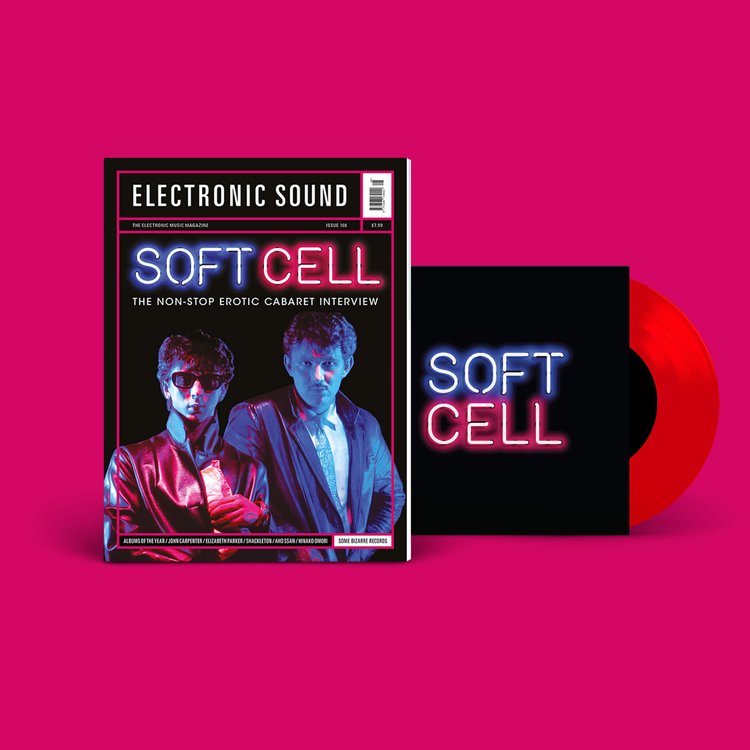
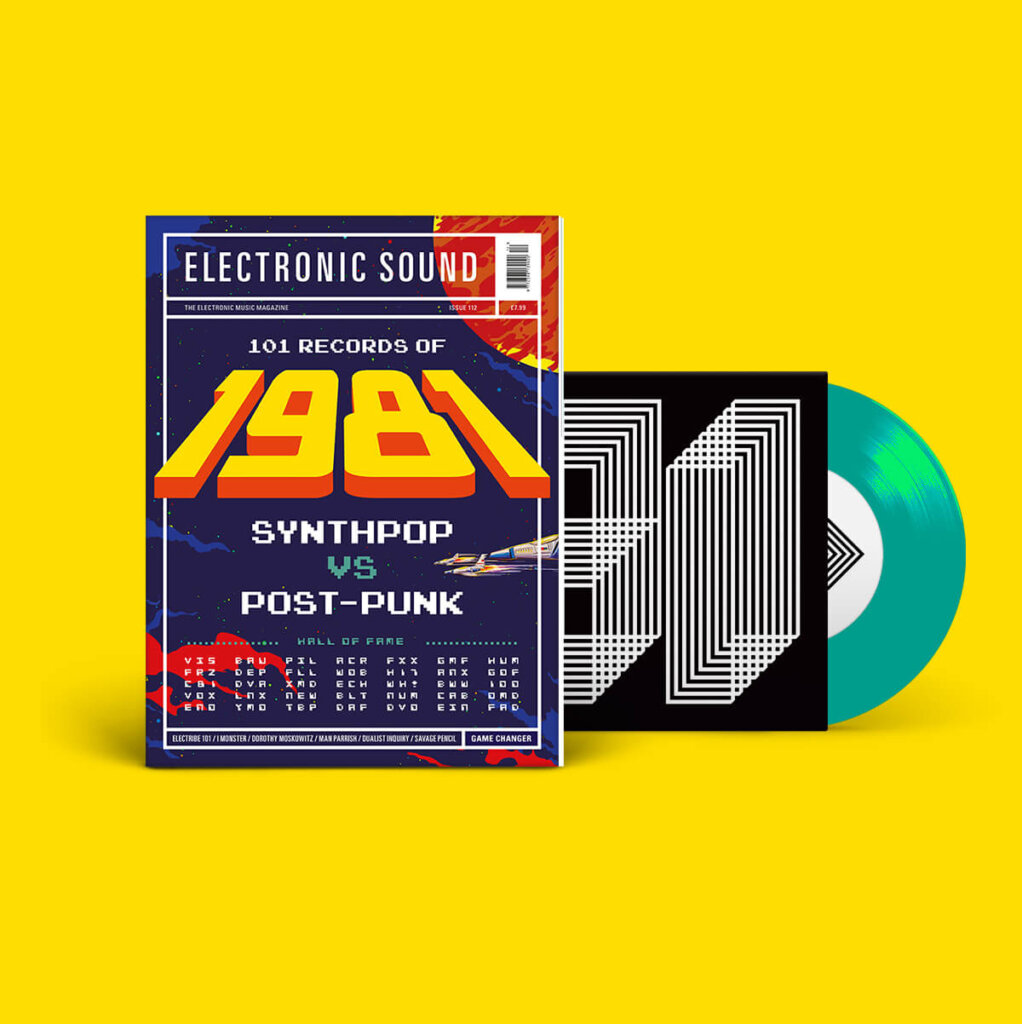
Not all of Asian Dub Foundation’s eclectic multimedia experiments have been quite as successful as their film scores. In 2006, the band accepted a commission from the English National Opera to compose ‘Gaddafi: A Living Myth’, a punky drum ’n’ bass musical that received almost the same brutal treatment from critics as the Libyan dictator would suffer five years later at the hands of a bloodthirsty mob. Even so, Savale recalls the project as an educational experience. Travelling to Egypt and Libya for research, he visited one of Gaddafi’s sons, whose private garden zoo included a black panther and a white tiger.
“It’s a shame,” Savale sighs. “A lot of the elements really worked, like the music and the video. It was the more operatic stuff that didn’t work. If I did it again, I would do it with a live band, just a few actors and a bit of video. I learned a lot from that, actually. It took me down a peg.”
After the upcoming ‘THX’ tour, ADF are keen to find further candidates for their live film scores, but they are hoping to integrate the soundtracks into their normal shows instead of keeping the two separate. The band have also had offers to play some of their older albums in full, but Steve Savale is not quite ready for the Britpop nostalgia circus just yet.
“We are such a technologically orientated group,” he says. “But technology breaks down and doesn’t get replaced. So it’s a bit hard to recreate some of that stuff, you have to rethink it. We would probably do it if we got the right offer, but the idea of working really hard on something from the past doesn’t excite me that much.”
That’s the Asian Dub Foundation philosophy in a nutshell. Who wants to live in the past when the future is still ripe for the taking?
‘More Signal More Noise’ is out now on ADF Communications/Believe Recordings. ADF perform their live soundtrack to George Lucas’ ‘THX 1138’ at dates across the UK in October. For more information, visit asiandubfoundation.com
The musical legacy of ‘THX 1138’

A young George Lucas directed ‘THX 1138’ fresh from film school, six years before launching his mega-dollar ‘Star Wars’ empire. Based on his 1967 student short ‘Electronic Labyrinth THX 1138 4EB’, it stars Robert Duvall, Maggie McOmie and Donald Pleasence as drone workers in a nightmarish future society under constant high-tech surveillance and compulsory mind-control drugs.
Besides Lalo Schifrin’s electro-orchestral score, the original soundtrack features a constant background buzz of disembodied radio chatter, sinister machine voices and pitch-shifted telephone dial tones. An avant-garde piece of musique concrete in its own right, Walter Murch’s innovative sound design has since been sampled by a wealth of electronic musicians, including Orbital, Nine Inch Nails, The Shamen, Meat Beat Manifesto, Laibach and UNKLE.
Featuring white-clad, shaven-headed citizens and gleaming silver police robots, the film’s striking visuals were later edited into Peter Gabriel’s ‘I Have The Touch’ video, and faithfully recreated in the promo clips for Queen’s ‘Calling All Girls’ and Gang Starr’s ‘You Know My Steez’. More recently, the shimmering sunset finale of Daft Punk’s ‘Get Lucky’ video is modelled on the celebrated closing shots of ‘THX 1138’.

